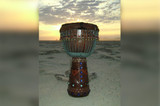Finding Yourself in a Drum Circle
There is a creative force that lives within any drummer; one that is pragmatic, yet, defies the rules of structure. This natural inclination for rhythm is alive in our heartbeats and in the cycles of nature, the planet and the daily ticking of the clock. Drum circles are a true example of how easy it is learn more about ourselves through community drumming, bringing methods of mindfulness within a group setting. It is this stillness within sound that can create some powerful insights for personal development.
When it comes to living authentically, there can be several ways to “find yourself” through the arts. Drum circles invite drummers to discover their own style of rhythm on a djembe, bongos, cajon or other hand drum, interweaving it into the bigger mix of sound while allowing for moments of introspection and collective learning. Since drumming actively stimulates various areas of the brain while reducing stress and anxiety, the process of drumming with others is a journey of discovery, leading to a higher regard and knowledge of our own thoughts, beliefs and desires.
The exploratory nature of drumming and rhythm is one that reaches into the deepest parts of our selves, releasing characteristics we may thought were buried, or encouraging new aspects of our personalities to shine brightly. When we participate in a drum circle, however, we are able to gain feedback through smiles and clapping or through the movements of our own hands on the surface of the drum as we are swept away in the rhythm. We are in the moment, we are breathing together and creating a magic that ties us together as a community. Our thoughts are focused on the beat, the groove, and the complimentary efforts of all involved. We realize our part in the greater rhythm is more literal than can be defined, and this realization is what brings us back to our own self.

Personal growth and finding one’s self, no matter the phase of life, is a never-ending process that can be enhanced through participating in drum circles and drumming events. All it takes is the willingness to try something new, and the understanding that once you leave the drum circle, you will never be the same person again.
Recent Posts
-
What is the Best Size Djembe for Beginners?
If you're new to the world of percussion and interested in learning the djembe, you're in for a t …16th Jul 2024 -
The Benefits of Becoming a Drumming Teacher: Transforming Passion into Profession
Why become a drumming teacher? Becoming a drumming teacher is an excellent way to share your pas …22nd May 2024 -
What Makes the Djembe Drum a Spiritual Instrument in African Music?
Origin and history of the Djembe drum The Djembe drum originates from West Africa and holds sign …16th May 2024




